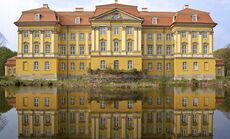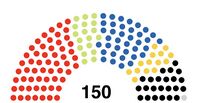National Assembly (Slovertia): Difference between revisions
Slovertia12 (talk | contribs) No edit summary |
Slovertia12 (talk | contribs) No edit summary |
||
| (13 intermediate revisions by the same user not shown) | |||
| Line 1: | Line 1: | ||
{{Infobox legislature | {{Infobox legislature | ||
| name = National Assembly of Slovertia | | name = National Assembly of Slovertia | ||
| native_name = ''Národné zhromaždenie Slovertskó'' | | native_name = ''Národné zhromaždenie Slovertskó'' <br> ''Zgromadzenie Narodowe Słowertiej'' | ||
| native_name_lang = | | native_name_lang = | ||
| transcription_name = | | transcription_name = | ||
| legislature = | | legislature = | ||
| coa_pic = | | coa_pic = NatAssemblyslv.jpeg | ||
| coa_caption = Sloverti National Assembly Buildings in [[Brativas]] | | coa_caption = Sloverti National Assembly Buildings in [[Brativas]] | ||
| coa_alt = | | coa_alt = | ||
| logo_pic = | | logo_pic = SlovertiaCoatOfArms-transparent.PNG | ||
| logo_res = 100px | | logo_res = 100px | ||
| logo_caption =Coat of Arms of Slovertia | | logo_caption =Coat of Arms of Slovertia | ||
| Line 69: | Line 69: | ||
}} | }} | ||
The National | The National Assembly of [[Slovertia]], is the national parliament of [[Slovertia]]. It is unicameral and consists of 150 members who are elected to it every five years. The members of the assembly are given the name 'deputies' and meet in [[Brativas]]. They are electedthrough universal sufferage during parliamentary elections. The National Assembly came into its current state in 1991 after the fall of Technocratic Slovertia. The National Assembly presides over passing domestic legislation, The ratification of international treaties, decisions surrounding the [[Defense Forces (Slovertia)|Defence Forces]] and other powers typical of a parliamentary system of government. Members are elected from Slovertia's 150 municipalities which they represent in the Assembly. | ||
The National Assembly | |||
==Functions== | ==Functions== | ||
The | The National Assembly serves as Slovertia's sole legislative body and is therefore tasked with the passing of all domestic bills and legislation. One of the key components of this task is to uphold the constitution of Slovertia and make ammendments to the constitution. The National Assembly is slso responsible for the state budget. Another part of the assembly's role is the ratification of international treaties as well as the decisions over the defence forces. If approved by the assembly the [[Defense Forces (Slovertia)|Defence Forces]] can be deployed in foreign countries and have been on several internationally coordinated peacekeeping missions. | ||
==Decision Making== | ==Decision Making== | ||
The parliament may vote only if a majority of all its members | The parliament may vote only if a majority of all its members are present. To pass a decision, the approval of a majority of all deputies present is required. For a bill to become law it must be subject to more than one vote in the assembly. If both votes are in favour then that legislation can become law. | ||
==Elections== | ==Elections== | ||
Deputies are elected by {{wp|universal sufferage}} for five year terms. Any Sloverti citizen aged 18 or over may vote in an assembly election. Elections occur under the system of {{wp|Mixed-member proportional representation}}. As Slovertia is a multi party system this leads to the need for the need to form coalition governments as it is extremely rare that one party pulls off an absolute majority. | |||
[[Category: Slovertia]] [[Category:Astyria]] [[Category: Politics of Slovertia]] | [[Category: Slovertia]] [[Category:Astyria]] [[Category: Politics of Slovertia]] | ||
Latest revision as of 17:33, 23 February 2024
National Assembly of Slovertia Národné zhromaždenie Slovertskó Zgromadzenie Narodowe Słowertiej | |
|---|---|
 Sloverti National Assembly Buildings in Brativas | |
 Coat of Arms of Slovertia | |
| Type | |
| Type | |
| Leadership | |
Speaker | Matús Teerijev |
 | |
Political groups | Sloverti Labour Party: 57 seats Sloverti Green Party: 18 seats National Party: 37 seats
Liberal Pact: 14 seats
Sloverti People's Party: 23 seats Independent: 1 seat
|
| Meeting place | |
| National Assembly Buildings in Brativas | |
The National Assembly of Slovertia, is the national parliament of Slovertia. It is unicameral and consists of 150 members who are elected to it every five years. The members of the assembly are given the name 'deputies' and meet in Brativas. They are electedthrough universal sufferage during parliamentary elections. The National Assembly came into its current state in 1991 after the fall of Technocratic Slovertia. The National Assembly presides over passing domestic legislation, The ratification of international treaties, decisions surrounding the Defence Forces and other powers typical of a parliamentary system of government. Members are elected from Slovertia's 150 municipalities which they represent in the Assembly.
Functions
The National Assembly serves as Slovertia's sole legislative body and is therefore tasked with the passing of all domestic bills and legislation. One of the key components of this task is to uphold the constitution of Slovertia and make ammendments to the constitution. The National Assembly is slso responsible for the state budget. Another part of the assembly's role is the ratification of international treaties as well as the decisions over the defence forces. If approved by the assembly the Defence Forces can be deployed in foreign countries and have been on several internationally coordinated peacekeeping missions.
Decision Making
The parliament may vote only if a majority of all its members are present. To pass a decision, the approval of a majority of all deputies present is required. For a bill to become law it must be subject to more than one vote in the assembly. If both votes are in favour then that legislation can become law.
Elections
Deputies are elected by universal sufferage for five year terms. Any Sloverti citizen aged 18 or over may vote in an assembly election. Elections occur under the system of Mixed-member proportional representation. As Slovertia is a multi party system this leads to the need for the need to form coalition governments as it is extremely rare that one party pulls off an absolute majority.